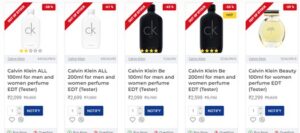The Delhi High Court recently in the case of Coty Germany GmBH v. Xeryus Retail Private Limited (CS(COMM) 1298/2018 & I.A. 8603/2023) permanently restrained two websites, namely perfumery.co.in and unboxed.in, from selling perfume tester bottles bearing the “Calvin Klein” or “cK” trademarks and imposed INR 1,00,000 (approx. USD 1,200) to be paid to Coty Germany GmBH (“Coty”). This appears to be the first instance of an Indian court considering the issue as to whether sale of perfume testers would amount to trademark infringement and/or passing off.
Court Proceedings
The suit for trademark infringement and passing off was filed by Coty in December 2018 and an ex parte interim injunction was granted in favour of Coty on 19 December 2018. Post the grant of the ex parte interim injunction, the Defendant, Xeryus Retail, filed its written statement (being the main reply to the plaint) but since this was done after expiry of the statutory period of 120 days, it was not taken on record. Thereafter, since Xeryus Retail remained unrepresented, in February 2023, the Court decided to proceed ex parte, and passed a summary judgment on 21 July 2023.
Coty in the instant suit had alleged that Xeryus Retail was marketing and selling its products using the “Calvin Klein” or “cK” marks and also selling Calvin Klein branded perfume testers for commercial value. Coty alleged that since the perfume testers were only intended to enable a prospective customer to sample the fragrance before deciding to purchase the bottle and that such testers were not meant to be sold for commercial value, selling perfume testers for commercial value fell in the category of unfair trade practice.
The Court agreed and permanently injuncted Xeryus Retail from using the Calvin Klein or cK marks in relation to its products as well as the business of perfume testers and allied products.
Concluding Remarks
The case is unique since it has clarified the position in respect of sale of perfume testers, which are genuine branded goods sourced from the brand owner, but cannot be commercially sold by third parties, since no authorization of sale has been provided by the brand owner. While the impact of this decision should be specifically applicable to online perfume retailers who often source and sell tester bottles in India through their websites, it could also be applicable to other product categories, wherein samples / demo units of products, such as of electronic items are provided by the brand owners to retailers, only to allow customers to sample or experience the product. Such demo units or samples are never marked for commercial sales, which means that the doctrine of exhaustion cannot apply (in case the sample /demo product has been sold to the retailer rather than being offered without any cost to the retailer).
_____________________________
To make sure you do not miss out on regular updates from the Kluwer Trademark Blog, please subscribe here.





The issue of commercial sale of perfume testers as part of trademark law in India raises an important discussion about unfair trade practices. Under Indian Trademark law, selling perfume testers as commercial products can mislead consumers and create confusion about the brand’s actual offerings. Testers are typically intended for display or testing purposes and not for retail sale, and when sold commercially, they could be seen as an attempt to deceive consumers into believing they are purchasing the original product. As a result, this practice can undermine the reputation and goodwill of the trademark owner. It’s crucial for brands to be vigilant and for authorities to take appropriate actions to prevent such unfair trade practices, ensuring that the consumers are protected and that brands’ intellectual property rights are respected.